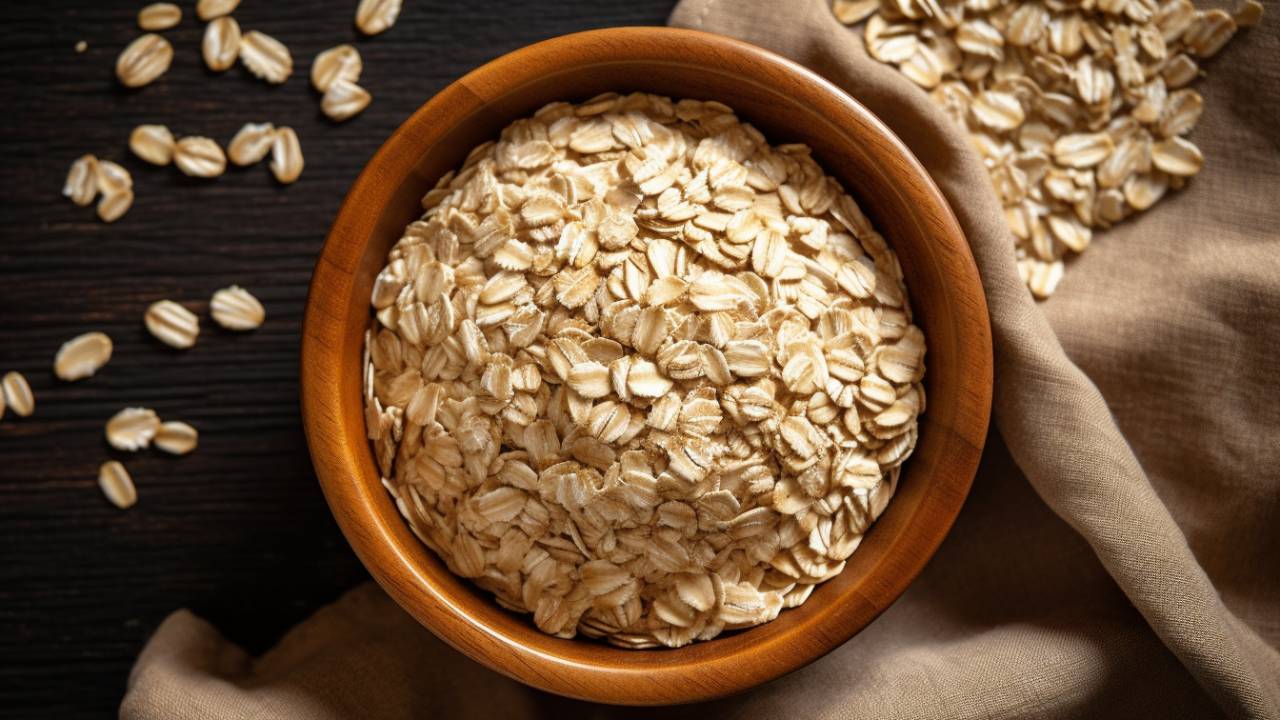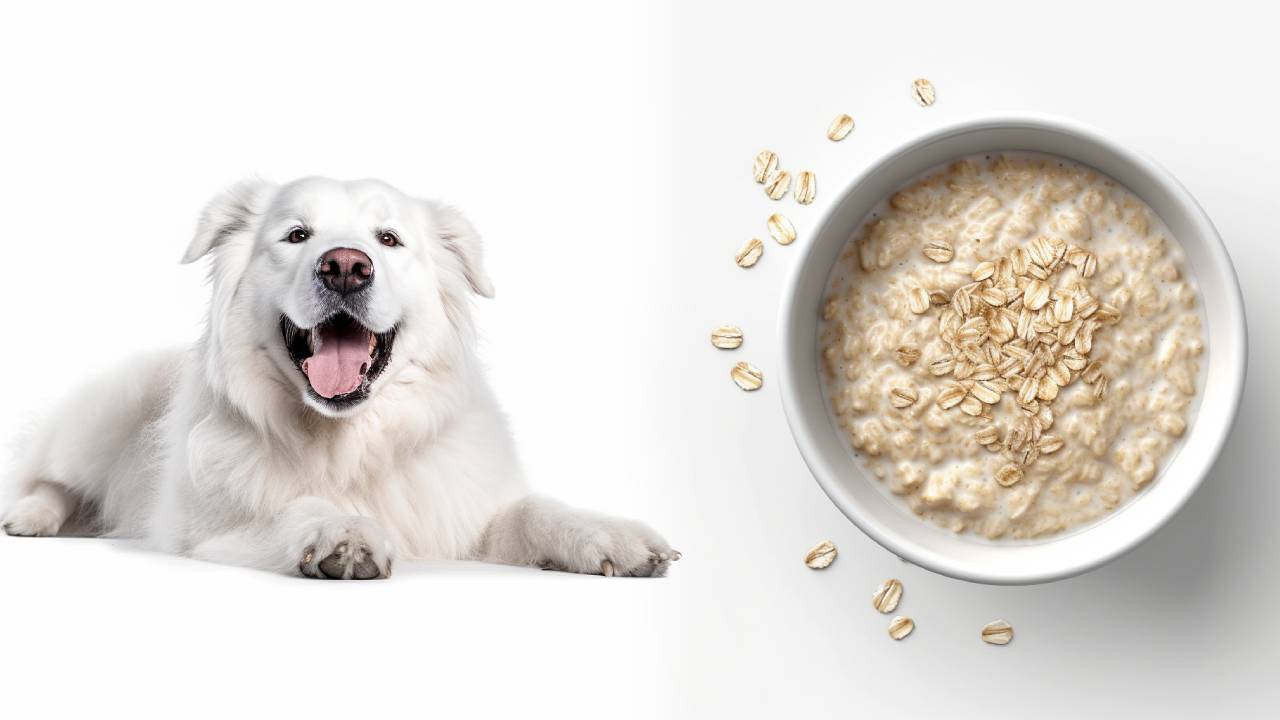Imagine a cozy morning with your furry companion and the scent of freshly cooked oatmeal filling the air. As you enjoy this nutritious breakfast, your dog’s endearing gaze begs the question: Can dogs partake in oatmeal, too?
This article delves into the nutritional aspects of oatmeal for dogs, uncovers its advantages, and imparts the know-how for crafting oatmeal specifically for your canine friend.
Oatmeal and Dogs: A Nutritional Analysis
Before diving into the heart of the matter, let’s dissect the nutritional profile of oatmeal. Oatmeal is a whole-grain powerhouse packed with complex carbohydrates, fiber, vitamins, and minerals. These elements are just as beneficial for our canine companions as they are for us.
Complex Carbohydrates: Oatmeal offers a sustained release of energy due to its complex carbohydrate content. This is particularly advantageous for dogs with active lifestyles, providing a steady influx of fuel throughout the day.
Fiber: The soluble fiber in oatmeal aids digestion and can be especially helpful for dogs with gastrointestinal sensitivities. It promotes regular bowel movements and contributes to overall gut health.
Vitamins and Minerals: Oatmeal contains essential vitamins such as vitamin B and minerals like iron and zinc, which are crucial for a dog’s immune system, skin health, and overall vitality.

Benefits of Feeding Oatmeal to Dogs
- Digestive Health: Oatmeal is a gentle digestive aid, making it a fantastic choice for dogs with sensitive stomachs or mild gastrointestinal issues. The fiber content can help regulate bowel movements and ease digestive discomfort.
- Weight Management: The complex carbohydrates in oatmeal provide a sense of fullness, aiding in weight management for dogs prone to obesity. It’s a healthier alternative to many commercial treats that might be loaded with empty calories.
- Skin and Coat Health: The vitamins and minerals in oatmeal contribute to a dog’s skin and coat health. It can help alleviate itchiness and dryness, promoting a glossy coat and reducing the risk of excessive shedding.
- Heart Health: Oatmeal is heart-friendly due to its high soluble fiber content, which can help regulate cholesterol levels. A healthier heart leads to a happier, more active pup.
- Low Allergen Potential: Oatmeal is a gluten-free option, making it a safe choice for dogs with wheat allergies or sensitivities.
Cooking Oatmeal for Your Canine Companion
Now that we’ve established the benefits of incorporating oatmeal into your dog’s diet, let’s explore how to prepare this canine-friendly treat.
- Choose the Right Oats: Opt for plain, unflavored oats like rolled or steel-cut. Avoid instant oats or those with added sugars, flavors, or seasonings.
- Cooking Method: Cook the oats with water or a dog-safe broth, avoiding seasoning or additives. Dogs have sensitive palates, and simple is always best.
- Skip the Sweeteners: Dogs do not need added sugar in their diet. Skip sweeteners like honey, maple syrup, or sugar when preparing oatmeal for your furry friend.
- Cooling Time: Allow the cooked oatmeal to cool down before serving it to your dog. Dogs are sensitive to temperature, and you wouldn’t want them to burn their mouths.
- Portion Control: Remember, moderation is key. A small portion of oatmeal is appropriate as an occasional treat or a meal supplement. Too much oatmeal can lead to an excessive intake of carbohydrates, affecting your dog’s weight and digestion.
Incorporating Oatmeal into Your Dog’s Diet
Mixing with Regular Food: You can introduce oatmeal by mixing a small amount with your dog’s regular food. This can add an extra nutritional boost and variety to their meals.
Topping for Treats: Sprinkle a small amount of cooked oatmeal on top of your dog’s favorite treats. This can turn a mundane treat into a delightful and healthier indulgence.
Homemade Treats: Get creative in the kitchen by making homemade dog treats using oatmeal as one of the ingredients. There are numerous recipes available that cater specifically to canine taste buds.
Conclusion
Oatmeal confidently secures its place as a nutritious option in dog diets. Dogs can safely enjoy oatmeal, with benefits ranging from improved digestion to healthier coats.
Quality, moderation, and your dog’s preferences are essential as you explore oatmeal’s potential. Whether as a supplement or treat, oatmeal is a loyal ally in promoting your dog’s health.
So, next time you savor a bowl of oatmeal, think about sharing the goodness with your furry companion – a gesture that promises tail-wagging delight.

FAQs
Can I add toppings like fruits to my dog’s oatmeal?
Absolutely! While introducing new ingredients, ensure they are safe for dogs. Stick to dog-friendly fruits like blueberries or apples. Avoid grapes, raisins, and anything with seeds.
How often can I offer oatmeal to my dog?
Oatmeal is a treat, not a staple. It’s great a few times a week, but not daily. Monitor your dog’s response and consult your vet if you need more clarification about frequency.
Can puppies eat oatmeal, too?
Yes, but with caution. Puppy diets require specific nutrients for growth. Consult your vet before introducing oatmeal. If approved, offer it occasionally in small portions.
My dog has a sensitive stomach. Can oatmeal help or hurt?
Oatmeal’s gentle fiber can aid sensitive stomachs. However, introduce it gradually and watch for any adverse reactions. Consult your vet for tailored advice.
Can I prepare oatmeal with milk for my dog?
Opt for water or dog-safe broth instead. While some dogs tolerate milk, many are lactose intolerant. Play it safe and stick to non-dairy options.
Are there any oatmeal varieties to avoid?
Yes, avoid flavored or instant oatmeal with added sugars and artificial additives. Stick to plain, unflavored oats for your dog’s well-being.
My dog is overweight. Can oatmeal help with weight management?
Yes, oatmeal fiber can help your dog feel fuller for longer. However, consult your vet before making significant dietary changes for an overweight dog.






0 Comments